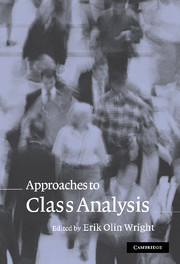Book contents
- Frontmatter
- Contents
- List of figures
- List of tables
- List of contributors
- Introduction
- 1 Foundations of a neo-Marxist class analysis
- 2 Foundations of a neo-Weberian class analysis
- 3 Foundations of a neo-Durkheimian class analysis
- 4 Foundations of Pierre Bourdieu's class analysis
- 5 Foundations of a rent-based class analysis
- 6 Foundations of a post-class analysis
- Conclusion: If “class” is the answer, what is the question?
- References
- Index
3 - Foundations of a neo-Durkheimian class analysis
Published online by Cambridge University Press: 22 September 2009
- Frontmatter
- Contents
- List of figures
- List of tables
- List of contributors
- Introduction
- 1 Foundations of a neo-Marxist class analysis
- 2 Foundations of a neo-Weberian class analysis
- 3 Foundations of a neo-Durkheimian class analysis
- 4 Foundations of Pierre Bourdieu's class analysis
- 5 Foundations of a rent-based class analysis
- 6 Foundations of a post-class analysis
- Conclusion: If “class” is the answer, what is the question?
- References
- Index
Summary
The class analytic tradition has come under increasing attack from postmodernists, anti-Marxists, and other commentators who argue that the concept of class is an antiquated construction of declining utility in understanding modern or postmodern inequality. In large part, this state of affairs might be blamed on class analysts themselves, as they have invariably represented the class structure with highly aggregate categories that, for all their academic popularity, have never been deeply institutionalized in the world outside academia and hence fail the realist test. By defaulting to nominalism, the class analytic tradition becomes especially vulnerable to critique, with postmodernists in particular arguing that academics have resorted to increasingly arcane and complicated representations of the class structure because the site of production no longer generates well-organized classes that academics and others can easily discern.
The purpose of this chapter is to outline a neo-Durkheimian alternative to such postmodernism that points to the persistence of class-like structuration at a more disaggregate level than class analysts have typically appreciated. It follows that class analysis is well worth salvaging; that is, rather than abandoning the site of production and concentrating exclusively on other sources of attitudes and behavior (e.g., race, ethnicity, gender), one should recognize that the labor market is indeed organized into classes, albeit at a more detailed level than is conventionally allowed.
Information
- Type
- Chapter
- Information
- Approaches to Class Analysis , pp. 51 - 81Publisher: Cambridge University PressPrint publication year: 2005
Accessibility standard: Unknown
Why this information is here
This section outlines the accessibility features of this content - including support for screen readers, full keyboard navigation and high-contrast display options. This may not be relevant for you.Accessibility Information
- 55
- Cited by
